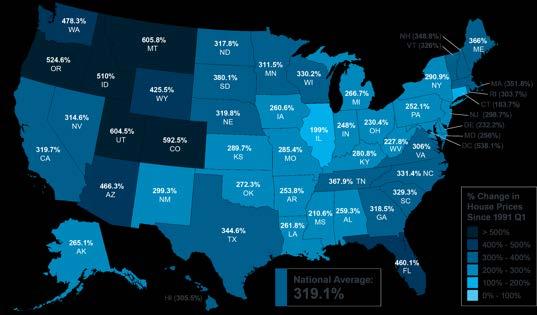













ThereÕs no arguing this past year has been challenging for homebuyers. But the market is in a transition right now. And that gives todayÕs homeowners three key opportunities.
One of the most significant shifts in the market this year is how the supply of homes for sale has increased. As data from Realtor.com shows, inventory is up more than 36% year over year. This means you have a better chance of finding a home that suits your needs and preferences. But that doesn't mean we've got a sudden surplus. We’re still almost 29% lower than the inventory levels we had in normal, pre-pandemic years (see graph below):
Inventory Is Improving, But Still Below Pre-Pandemic Norms
National Inventory Change, Percent Year-Over-Year vs. Pre-Pandemic (2017 2019)
Source: Realtor.com
And if you still don’t see an existing home you like, another big opportunity lies in the rise of new home construction. According to data from the Census and NAR, one in three homes on the market is a newly built home. But don't worry, that's not because of overbuilding – builders are just catching up after years of underbuilding.
And since builders have been focusing on smaller, more affordable homes, you can really open up your pool of options if you add new builds to your search.
And third, home prices are showing signs of moderation – and that’s a welcome shift after the rapid appreciation seen in recent years (see graph below):
As Marco Santarelli, the Founder of Norada Real Estate Investments, says:
“This moderation is mostly due to supply and demand. Supply is growing and demand is more moderate, so prices aren’t rising as fast. But make no mistake, that doesn’t mean prices are falling – they’re just rising at a more normal pace. That slowing price growth means you’re less likely to face the steep price increases we saw a few years ago.”

If you’re ready and able to buy, you may find the coming months a bit easier to navigate. On the other hand, you could choose to wait. But if you do, here’s the risk you run. As more buyers recognize the shift in the market, competition will grow again.
On a similar note, if mortgage rates come down further, more buyers will come back into the market. So, making a move now helps you take advantage of the current market conditions and get ahead of those other buyers.
LetÕs connect to talk more about the opportunities you have in todayÕs market.
Home prices will keep rising, just at a more normal pace. That means you won’t have to deal with prices skyrocketing when you buy, and your home should grow in value once you do.

As inflation and the economy continue to cool, mortgage rates should ease. This will help with affordability, especially as price growth moderates too. As the Mortgage Reports says:
“With inflation dwindling and Fed cuts expected, most industry forecasts predict mortgage rates to decrease over the rest of 2024 and 2025. However, it could be more of a slow burn opposed to a rapid decline."



ÒThereÕs never a one-size-fits-all answer to whether now is the right time to buy a home. . . ThereÕs also no way to predict precisely what the market will do in the near future . . . Perfectly timing the market shouldnÕt be the goal. This decision should be determined by your personal needs, financial means and the time you have to find the right home.Ó
- U.S. News Real Estate

Are you wondering if it makes sense to buy a home right now? While todayÕs mortgage rates might seem a bit intimidating, here are two reasons why it still may be a good time to become a homeowner.
There’s been some confusion over the past year or so about which way home prices are headed. Make no mistake, nationally they’re still going up. In fact, over the long-term, home prices almost always go up (see graph below):
Price Appreciation over the Last 60 Years
Average Sales Price of Houses Sold in the United States
Source: Census, HUD
Based on the graph above, you can see the overall trend in home prices has climbed steadily for the past 60 years. There was an exception during the 2008 housing crash when prices didn't follow the normal pattern, but generally, home values keep rising.
This is a big reason why buying a home can be better than renting. As prices go up and you pay down your mortgage, you build equity. Over time, this growing equity can really increase your net worth.
Here’s another reason you may want to think about buying a home instead of renting – rent just keeps going up over time. Sure, it might be less expensive to rent right now in some areas, but every time you renew your lease or sign a new one, you’re likely to feel the squeeze of your rent getting higher. According to data from iProperty Management, rent has been going up pretty consistently over the last 60 years, too (see graph below):
Average Monthly Rent in the United States (1960 2023)
Source: iProperty
So how do you escape the cycle of rising rent? Buying a home with a fixed-rate mortgage helps you stabilize your housing costs and say goodbye to those annoying rent increases. That kind of stability is a big deal.
Your housing payments are like an investment, and you've got a decision to make. Do you want to invest in yourself or keep paying your landlord?
When you own your home, you're investing in your own future. And even when renting is less expensive, that money you pay every month is gone for good. As Dr. Jessica Lautz, Deputy Chief Economist and VP of Research at the National Association of Realtors (NAR), states:
“If a homebuyer is financially stable, able to manage monthly mortgage costs and can handle the associated household maintenance expenses, then it makes sense to purchase a home.” $0
When it comes down to it, buying a home offers more benefits than renting, even when mortgage rates are high. If you want to avoid increasing rent payments and take advantage of long-term home price appreciation, letÕs connect to go over your options.
If you’re thinking about buying a home this year, be sure to consider the long-term financial benefits of homeownership.
Equity is the current value of your home minus what you still owe on your loan. It goes up when:
• You pay down your loan
• Home prices appreciate

Here’s a look at how just the home price appreciation piece can increase your wealth over time.
Since Q1 1991, Q2 2024

Source: FHFA

Buyers face challenges in any market and todayÕs is no different. But, thereÕs one way to avoid getting tripped up, and thatÕs leaning on a real estate agent for expert advice.
An expert’s insights will help you avoid some of the most common mistakes homebuyers are making right now.
As part of the homebuying process, a lender will look at your finances to figure out what they’re willing to loan you for your mortgage. This gives you a good idea of what you can borrow so you can really wrap your head around the financial side of things before you start looking at homes. While house hunting can be a lot more fun than talking about finances, you don’t want to do this out of order. Make sure you get your preapproval first. As CNET explains:
“If you wait to get preapproved until the last minute, you might be scrambling to contact a lender and miss the opportunity to put a bid on a home.”
While you may have a long list of must-haves and nice-to-haves, you need to be realistic about your home search. Even though your ideal state is you find a home that checks every box, you may need to be willing to compromise. A home that has everything you want may be too pricey. As Investopedia puts it:
“When you expect to find the perfect home, you could prolong the homebuying process by holding out for something better. Or you could end up paying more for a home just because it meets all your needs.”
Instead, look for something that has most of your must-haves and good bones where you can add anything else you may need down the line.
With today’s mortgage rates and home prices, there’s no arguing it’s still expensive to buy a home. And while it may be tempting to stretch your finances a bit further than you’re comfortable with to make sure you get the house, you want to avoid overextending your budget. Make sure you talk to your agent about how changing mortgage rates impact your monthly payment. Bankrate offers this advice:
“Focus on what monthly payment you can afford rather than fixating on the maximum loan amount you qualify for. Just because you can qualify for a $300,000 loan doesn’t mean you can comfortably handle the monthly payments that come with it along with your other financial obligations.”
This last one may be the most important of all. Buying a home is a process that involves a lot of steps, paperwork, negotiation, and more. Rather than take all of this on yourself, it’s a good idea to have a pro working with you. The right agent will reduce your stress and help the process go smoothly.
Mistakes can cost you time, frustration, and money. If you want to buy a home in todayÕs market, letÕs connect so you have a pro on your side who can help you avoid these missteps.

Consistency is the name of the game after applying for a mortgage. Be sure to discuss any changes in income, assets, or credit with your lender, so you don’t jeopardize your application.

Don’t change bank accounts. close any credit accounts.
Don’t deposit cash into your accounts before speaking with your bank or lender.

Don’t make any large purchases.

Don’t co-sign other loans for anyone.

The best plan is to fully disclose and discuss your intentions with your lender before you do anything financial in nature.
If youÕve decided youÕre ready to buy, chances are youÕre trying to figure out what to do first. It can feel a bit overwhelming to know where to start, but the good news is, you donÕt have to navigate all of that alone.
When it comes to buying a home, expert advice from a trusted real estate agent is priceless, now more than ever. And here’s why.
A real estate agent does a lot more than you may realize.
Your agent is the person who will guide you through every step when buying a home and look out for your best interests along the way. They smooth out a complex process and take away the bulk of the stress of what’s likely your largest purchase ever. And that’s exactly what you want and deserve.
This is at least part of the reason why a survey from Bright MLS found an overwhelming majority of people agree an agent is a key part of the homebuying process (see visual below):
Of respondents agree "It would be very stressful to navigate the home buying process without a real estate agent or broker.”
Of respondents believe "A real estate agent or broker is an essential, trusted advisor for a homebuyer."
Source: Bright MLS
To give you a better idea of just a few of the top ways agents add value, check out this list.
1. Deliver Industry Expertise: The right agent – the professional – will coach you through everything from start to finish. With professional training and expertise, agents know the ins and outs of the buying process. And in today’s complex market, the way real estate transactions are executed is constantly changing, so having expert advice on your side is essential.
2. Provide Expert Local Knowledge: In a world that’s powered by data, a great agent can clarify what it all means, separate fact from fiction, and help you understand how current market trends apply to your unique search. From how quickly homes are selling to the latest listings you don’t want to miss, they can explain what’s happening in your specific local market so you can make a confident decision.
3. Explain Pricing and Market Value: Agents help you understand the latest pricing trends in your area. What’s a home valued at in your market? What should you think about when you’re making an offer? Is this a house that might have issues you can’t see on the surface? No one wants to overpay, so having an expert who really gets true market value for individual neighborhoods is priceless. An offer that’s both fair and competitive in today’s housing market is essential, and a local expert knows how to help you hit the mark.
4. Review Contracts and Fine Print: In a fast-moving and heavily regulated process, agents help you make sense of the necessary disclosures and documents, so you know what you’re signing. Having a professional that’s trained to explain the details could make or break your transaction and is certainly something you don’t want to try to figure out on your own.
5. Bring Negotiation Expertise: From offer to counteroffer and inspection to closing, there are a lot of stakeholders involved in a real estate transaction. Having someone on your side who knows you and the process makes a world of difference. An agent will advocate for you as they work with each party. It’s a big deal, and you need a partner at every turn to land the best possible outcome.
Real estate agents are specialists, educators, and negotiators. They adjust to market changes and keep you informed. And keep in mind, every time you make a big decision in your life, especially a financial one, you need an expert on your side. Expert advice from a trusted professional is priceless.



